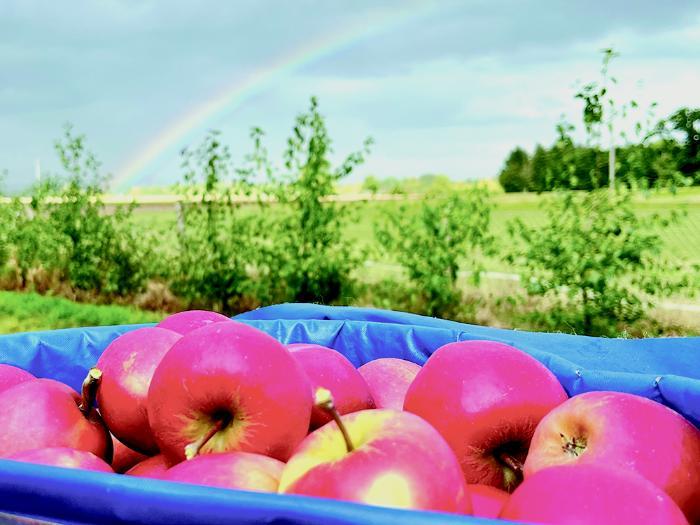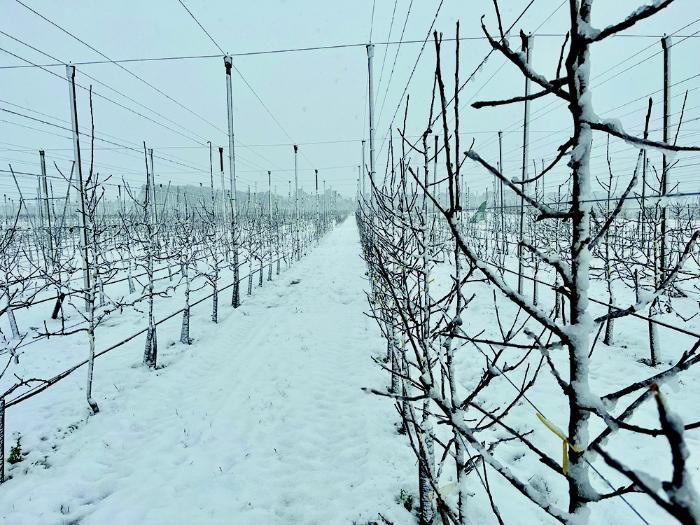24 February 2025
Rooting innovation: shaping Ireland’s apple future
A research initiative at Teagasc Oak Park aims to boost apple production in Ireland by exploring innovative training systems and rootstocks. The project focuses on improving yield efficiency, enhancing fruit quality, and cutting labour costs, offering Irish growers strategies tailored to the local climate.

Credit: Teagasc
Research initiatives by Teagasc are set to revitalise the dessert apple sector in Ireland. Despite a domestic market valued at €131 million, the majority of apples are imported, highlighting a significant opportunity for local growers. Ireland’s favourable climate, access to modern apple varieties, advanced technologies, and growing consumer preference for locally grown, plant-based foods all contribute to this opportunity. Furthermore, the environmental benefits of local apple production, such as carbon sequestration, make it a sustainable option.
The Efficient Orchard 2024 project marks a pivotal advance for the apple industry in Ireland, explains Teagasc Research Officer Alberto Ramos Luz.
“This initiative focuses on boosting production efficiency, improving fruit quality, and cutting labour costs by testing different training systems and rootstocks. The project’s main goal is to identify the best combinations for high-yield efficiency and top-quality fruit, specifically tailored to the Irish climate.”
Establishing efficiency
The Efficient Orchard 2024 project is being conducted at the Oak Park Research Centre in Carlow from 2024 to 2029, led by Alberto in collaboration with Syed Bilal Hussain of UCD’s School of Agriculture and Food Science. The project aims to evaluate the agronomic performance of 48 apple genotypes, including Alpigala, Story Inored, Inobi, Gala Buckeye, Elstar Red Flame, Elstar Elshof, and Wilton’s Star Red Jonaprince Select.
In Oak Park’s research orchard, these genotypes are grafted onto a variety of rootstocks – the below-ground root networks used for propagation – including M9, M200 and the Geneva series. These genotypes and rootstocks will be examined in conjunction with different training systems, such as Tall Spindle (high planting density, minimal pruning), V-Trellis (improved light exposure) and innovative two-dimensional training systems.

Credit: Teagasc
Understanding behaviour
A key objective is to gather preliminary data on the vegetative, reproductive, and physiological behaviour of apple trees under Irish conditions, explains Alberto.
“The study will closely monitor phenological development, vegetative growth such as the trunk cross-sectional area, reproductive performance – e.g. yield and yield efficiency – and fruit quality properties like size, weight, firmness, soluble solids, acidity and colour.”
He notes that although a full evaluation of the training systems would require at least 10 years to fully map out, the project aims to generate essential insights that will provide a starting point for guiding future research and orchard management strategies. Understanding the behaviour of different apple genotypes under various training systems and rootstocks is essential for advancing apple production in Ireland.
This research will provide key foundational data to guide the selection of varieties and systems with strong market potential, specifically adapted to Irish conditions, Alberto adds.
“The project’s main goal is to identify the best combinations for high-yield efficiency and top-quality fruit, specifically tailored to the Irish climate.”
“This project’s research outcomes will support the implementation of new orchard practices, informing future research to maximise yield efficiency and fruit quality. Ultimately, this will make apple production more attractive to Irish farmers by enhancing profitability and offering higher-quality fruit to consumers.”
In this short clip, we see Dr. Alberto Ramos Luz speaking about his research supporting the Irish apple industry by selecting varieties suited to Ireland, improving tree management for efficiency and quality, and aligning agronomic performance with consumer preferences. He explains that the goal of the research is to provide more profitable ways to grow apples in Ireland and increase the availability of high-quality Irish apples.
Boosting production
This research addresses economic, environmental and social issues, aligning with Teagasc’s strategic objectives. It supports rural development, reduces greenhouse gas emissions, aids climate change adaptation, promotes biodiversity, improves human health and nutrition, and ensures sustainable farming.
“By boosting the production of high-quality Irish apples, we can decrease reliance on imports, enhancing both sustainability and food security,” Alberto points out.
“In this broader context, apples serve as a pilot initiative, paving the way for further advancements in Irish fruit growing. By 2029, we anticipate having gained vital insights into the optimal combinations of apple genotypes, rootstocks and training systems best suited for Irish conditions. This knowledge will empower apple growers to diversify their production strategies with confidence, achieving high-yield efficiency and improved fruit quality.”
The research findings will enable growers to enhance profitability by adopting the most effective practices identified, significantly reducing the risks traditionally associated with establishing new orchards.
Funding
This project is internally funded by Teagasc.
Contributors
Alberto Ramos Luz, Fruit Research Officer Horticulture Development Department, Teagasc Oak Park. alberto.ramosluz@teagasc.ie
Ahmad Hassan Chaudhry, Walsh Scholar (Efficient Orchard project) Horticulture Development Department, Teagasc Oak Park/School of Agriculture and Food Science, University College Dublin.
Syed Bilal Hussain, Lecturer and Assistant Professor School of Agriculture and Food Science, University College Dublin.
